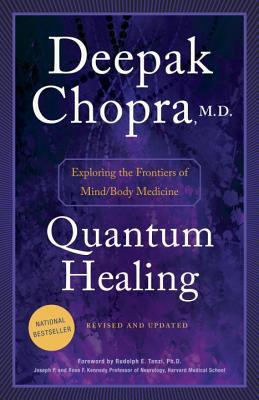
Quantum Healing: Exploring the Frontiers of Mind/Body Medicine
About the Author
Questions & Answers
Quantum healing challenges traditional medical models by emphasizing the interconnectedness of mind and body, suggesting that consciousness plays a crucial role in healing processes. It argues against the materialist and reductionist views that dominate modern medicine, which view the body as a machine and healing as a physical process. Quantum healing proposes that the mind can influence the body to heal, even in cases of spontaneous remission from diseases like cancer. It offers new insights by highlighting the importance of consciousness, self-awareness, and lifestyle choices in healing. It suggests that genes are not fixed but can be influenced by experiences, thoughts, and actions, leading to the concept of "self-directed biological transformation." This holistic approach to healing integrates quantum physics, ancient wisdom traditions, and modern medicine, offering a more comprehensive understanding of the human body and healing mechanisms.
Consciousness plays a crucial role in the healing process by influencing the mind-body connection. It initiates and coordinates the healing response within the body. This connection is a feedback loop where mental states, such as thoughts, emotions, and beliefs, affect physical processes. For example, positive emotions and a strong will to live can promote healing, while negative emotions and stress can hinder it. Quantum healing posits that consciousness can directly influence the body at a quantum level, potentially leading to spontaneous remission of diseases like cancer. Techniques like meditation and yoga can enhance this connection, fostering a state of inner awareness that promotes healing. The mind's ability to influence the body's genetic expression and physiological responses further underscores the importance of consciousness in the healing process.
The author, Deepak Chopra, integrates quantum physics with ancient wisdom traditions like Ayurveda by proposing that the human body is a quantum mechanical entity, influenced by the quantum field. He suggests that the mind and body emerge and unite from this field, and that healing mysteries, like spontaneous remission from cancer, are rooted in it. Ayurveda, with its focus on holistic health and balance, is seen as a precursor to this concept, emphasizing the interconnectedness of mind and body.
The implications for modern medicine and wellness practices are significant. They suggest that healing can be approached not just through physical interventions, but also by addressing mental, emotional, and spiritual aspects. This integration could lead to more personalized and effective treatments, potentially reversing chronic disorders and combating aging. It also highlights the importance of self-awareness and lifestyle choices in promoting health and wellness.
The key components of a quantum healing approach include recognizing the mind-body connection, embracing the holistic nature of the body, and understanding the role of consciousness in healing. Individuals can incorporate these principles into their daily lives by:
- Mindfulness: Practice mindfulness to be present in the moment, reducing stress and promoting overall well-being.
- Positive Lifestyle Changes: Adopt a healthy diet, regular exercise, and adequate sleep to support physical health.
- Meditation and Meditation Techniques: Engage in meditation to cultivate inner peace, reduce stress, and enhance self-awareness.
- Intention: Use intention to guide personal evolution and healing, focusing on positive thoughts and actions.
- Self-Care: Prioritize self-care by setting aside time for relaxation, reflection, and personal growth.
- Connection to Nature: Spend time in nature to connect with the environment and promote a sense of balance.
- Integrative Medicine: Combine conventional medical treatments with alternative practices like Ayurveda for a more holistic approach to health.
By integrating these practices into daily life, individuals can enhance their well-being and potentially improve their health outcomes.
The author's perspective on the human body and healing emphasizes the interconnectedness of consciousness, reality, and our place in the universe. He argues that the human body is not just a machine but a quantum mechanical entity, influenced by the mind and consciousness. This perspective challenges the materialist and reductionist views of modern science, which he believes overlook the holistic nature of the body and the mind-body connection.
By integrating quantum physics and ancient wisdom, the author suggests that consciousness is the source of reality and that we are all connected in a cosmic intelligence. This understanding of consciousness transcends the individual self, leading to a realization of our unity with the universe. The author's work encourages a reevaluation of our place in the cosmos, emphasizing the importance of self-awareness, mindfulness, and the cultivation of higher states of consciousness. This broader understanding of consciousness and reality fosters a sense of interconnectedness and responsibility, prompting individuals to seek personal transformation and contribute to the greater good.
